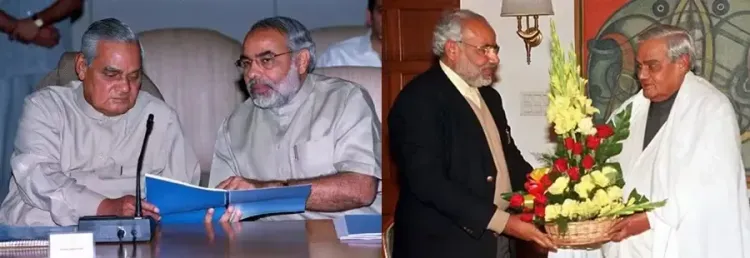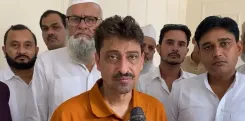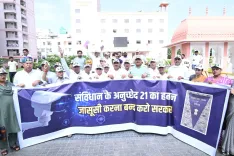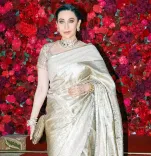A Tribute to Atal Bihari Vajpayee: PM Modi Honors a Visionary Leader on His 100th Birth Anniversary

New Delhi, Dec 25 (NationPress) Prime Minister Narendra Modi commemorated the legacy of former Prime Minister Atal Bihari Vajpayee, whom he referred to as the architect of India’s transition, while praising his significant role in political stability, nation-building, and commendable governance on the occasion of Vajpayee's centenary.
Atal Bihari Vajpayee was born on December 25, 1924, in Gwalior, Madhya Pradesh. He was not only a politician but also a poet, having served as Prime Minister of India for three non-consecutive terms: for 13 days in 1996, for 13 months from 1998 to 1999, and then for a full term from 1999 to 2004, making him the first non-Congress Prime Minister to complete a full term.
His influence on the nation’s political and social framework is profound. Notably, his birth anniversary is celebrated as Good Governance Day in India.
In a heartfelt blog entry, PM Modi expressed that December 25 is a momentous day for the nation, commemorating Vajpayee’s 100th birth anniversary.
"Today, 25th December represents a significant occasion for all of us. Our country celebrates the 100th Jayanti of our beloved former Prime Minister, Shri Atal Bihari Vajpayee Ji. He stands tall as a statesman who continues to inspire countless individuals," he wrote.
PM Modi emphasized Vajpayee’s crucial part in shaping the future of India, stating, "Our nation will forever be grateful to Atal Ji for being the architect of India’s transition into the 21st century. When he took office in 1998, India was grappling with significant political instability, having witnessed four Lok Sabha elections in just nine years."
"The populace was becoming restless and doubtful about the government's ability to deliver. It was Atal Ji who reversed this trend by providing stable and effective governance. Coming from modest beginnings, he understood the challenges faced by ordinary citizens and the transformative potential of effective governance."
PM Modi acknowledged Vajpayee's remarkable achievements across various sectors, stating, "His tenure was marked by a significant leap in the fields of Information Technology, telecommunications, and communications. The NDA Government under Atal Ji made the first earnest effort to make technology accessible to all citizens. The Golden Quadrilateral Project, which connected the vast expanse of India, is still remembered fondly by many. Additionally, the Pradhan Mantri Gram Sadak Yojana greatly improved local connectivity. His administration also laid the foundation for the Delhi Metro, which is now recognized as a world-class infrastructure project."
Focusing on Vajpayee’s contributions to social reforms, PM Modi remarked, "Initiatives like the Sarva Shiksha Abhiyan reflect Atal Ji’s vision of an India where modern education is available to everyone, especially the underprivileged. His government also oversaw numerous economic reforms that paved the way for India’s economic resurgence after years of stagnation."
PM Modi cited the 1998 Pokhran nuclear tests as an illustration of Vajpayee’s steadfast leadership.
"On May 11, India conducted the Pokhran tests, known as Operation Shakti. Any average leader might have succumbed to international pressure, but Atal Ji was different. India stood firm, proceeding with another set of tests on May 13. This was a clear message to the world that India would not yield to threats or pressure," he wrote.
Despite facing international sanctions, Vajpayee affirmed India’s right to protect its sovereignty while promoting global peace.
PM Modi further pointed out, "Atal Ji was instrumental in forming the NDA, which redefined coalition politics in India. He united people, making the NDA a robust force for development and national advancement. His parliamentary acumen was evident throughout his political career."
Criticizing the Congress party, PM Modi stated, "During his tenure as Prime Minister, he effectively countered opposition critiques with both style and substance. Despite spending a substantial portion of his career in opposition, he bore no resentment, even in the face of the Congress labeling him a traitor. He chose to resign in 1996 rather than engage in political horse-trading. In 1999, after losing by a mere vote, he maintained his integrity and returned with a decisive mandate."
Reflecting on Vajpayee’s dedication to democracy, PM Modi recalled, "He was significantly influenced by the martyrdom of Dr. Syama Prasad Mookerjee and was a key figure in the anti-Emergency movement. He agreed to merge the Jan Sangh with the Janata Party in 1977, prioritizing the Constitution over personal or party interests."
The Prime Minister also commended Vajpayee’s pride in Indian culture, referencing his speech in Hindi at the United Nations as External Affairs Minister, which exemplified his deep pride in India’s heritage and identity.
Describing Vajpayee’s character as magnetic, PM Modi noted, "A prolific writer and poet, he wielded words to inspire, provoke thought, and provide comfort. His poetry, reflecting his inner struggles and aspirations for the nation, continues to resonate with people across generations."
In conclusion, the Prime Minister recognized Vajpayee's foundational role in establishing the BJP and his unwavering commitment to ideology over power.
"On his 100th Jayanti, let us recommit ourselves to realizing his ideals and fulfilling his vision for India. Atal Ji's steadfast faith in our nation’s potential continues to motivate us to aim higher and work harder," he wrote.







